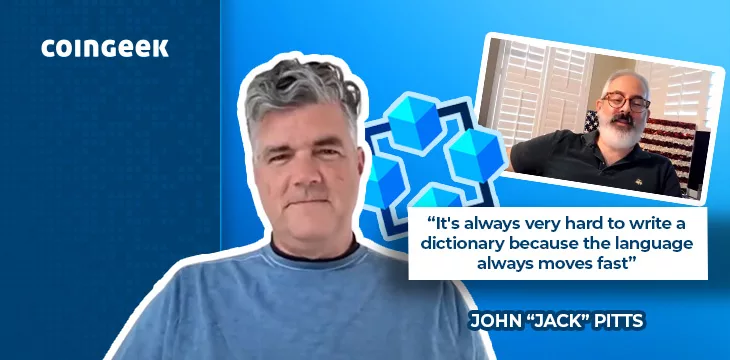|
Getting your Trinity Audio player ready...
|
SLictionary founder John ‘Jack’ Pitts joined Christopher Messina on the Messy Times podcast to talk about his company, BSV blockchain, the etymology and evolution of words, and more.
What is SLictionary, and how does it work?
Messina jumps in and asks Pitts who he is and what SLictionary is about. Pitts says he is Mel Gibson looking for his Sean Penn, referring to the movie “The Professor and the Madman” about the drafting of the first Oxford dictionary. He says that, with SLictionary, he wants to upend popular dictionaries like the Merriam-Webster and Urban dictionaries.
How is he approaching this? Both intuitively and creatively. However, he also uses the OED quotation system and what works from the existing dictionaries without using their data or definitions. He notes that crowdsourcing definitions is the best way—language moves so fast that nobody could keep up doing it all manually. Interestingly, he says that the Urban Dictionary was the first to define Bitcoin in 2011.
Pitts also feels that a corpus that allows competition creates intrigue. Finally, using the dictionary might be fun instead of a boring, necessary task. He’s concerned that AIs today use biased corpora with words and concepts defined by particular types of individuals.
Messina then asks what stops wrong definitions from creeping into SLictionary. Pitts answers that people won’t vote for or like it, so it won’t make money and will fall away by itself. Definitions are on individual satoshis, so whoever put it there will be keen to free that satoshi up if the definition doesn’t make money, so they’ll erase unprofitable definitions. Pitts says this is a lot like demolishing an old building in Manhattan to build something new.
Pitts then talks briefly about SLebrity definitions, something he has previously discussed on a CoinGeek Weekly Livestream. These are definitions penned by celebrities which can then be auctioned. Definitions then become tradable assets on the market and generate cash flow for their holders each time they are liked. People signing and putting definitions on coins makes the coins themselves more valuable, just as autographs on dollar bills make those more valuable.
What incentives users to create definitions? Aside from wanting to own the best definitions and generate cash from them, Word Bounties also play a role. People can put up an amount to have a word defined, and when people search for a word that isn’t there, they can donate their penny towards a bounty to have that word defined by someone else.
When did Pitts have the idea for SLictionary?
Pitts tells us the initial idea comes from back in his school days. He picked Latin in high school, disliked it intensely, and switched to computer science, where he programmed a self-learning spell checker. Remember, SLictionary stands for Self Learning Dictionary, so Pitts has been cooking this idea in his mind ever since his initial successful app in high school. Incidentally, the computer system in the school crashed as a result; these were the very early days of computers.
Pitts says he wants to end “right-clicking for definitions.” He has a new idea for how to do this, but he’s keeping it under wraps until it’s ready for release. He recommends viewers go to SLictionary.com and see how all of this works.
What about existing systems like Wikipedia? How will SLictionary compete? Aside from the financial incentives, Wikipedia is broken beyond repair. Anyone can change anything, and there’s no serious adjudication system. It’s like allowing someone to paint a mustache on the Mona Lisa. Messina says he loves it when someone “miscorrects” him, meaning they correct him, but they are wrong. Pitts picks up on this phrase and asks him to define it on SLictionary, talking him through the process.
What about trademarks such as the Navy Seals? Pitts says SLictionary is subject to all the same rules and laws as everyone else and will comply with takedown requests. However, he believes there’s room for the free market to sort much of this out—perhaps a deal can be made where the trademark holder gets the lion’s share of the revenue from a definition.
Wrapping up, Pitts gives his big picture view on SLictionary: it can tell us what the true most popular definitions of words are, allowing us to put an actual number on it, and it can also allow us to track how language is changing as no other dictionary can. Everything will be right there on the blockchain, and that’s valuable!
CoinGeek Conversations with John “Jack” Pitts: English speakers are the real keepers of English lexicon

 02-17-2026
02-17-2026 




